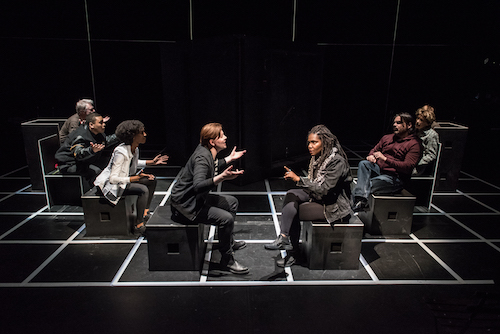 Toronto’s Canadian Stage presents Caryl Churchill’s play Love and Information
Toronto’s Canadian Stage presents Caryl Churchill’s play Love and Information
I adore the work of playwright Caryl Churchill. First and foremost, it is provocative on an intellectual level, best appreciated if you’re consciously drawn to the ideas contained in dramatic situations. She favours non-naturalistic devices that prompt the audience to engage—consciously—with the mechanics of theatrical presentation, to examine language and movement, notice patterns and reflect upon them. Because of this, her text can be tricky to sell—emotionally. With masterful precision, Canadian Stage Company’s production of Love and Information allows all the ideas to sizzle and pop with fiery life.
On a mostly bare set that suggests a white wireframe in a black void, eight actors portray over one hundred characters in a series of vignettes that range from under thirty seconds to about three minutes. We don’t spend much time with any of these people yet the brief glimpses we get are vivid and compelling. Each of these short scenes are introduced with a projected title card that reinforces the notion that ideas are of utmost importance here.
Overall, the play conveys the overwhelming amount of information we are required to process in our daily lives. Specifically, it explores how bombarded we are by information, especially now with social media and the immediacy of wide-spread communication. The information presented here takes many forms—some verbal, some physical. There are: secrets, confessions, revelations, debates, reminiscences. Churchill varies the tone and rhythm of these scenes as well as the specificity of the information presented. Sometimes the information is vague, the holder of it guarded.
In one of the more intense bits, two men lie in bed, one having just woken from a nightmare, his partner trying to comfort him. The content of the nightmare is never revealed, we only see how it has impacted these two lovers and intrudes violently upon their intimacy.
Some scenes play less like snapshots of daily life and more like fables. Take, for instance, the quick and very sharp vignette of the child who couldn’t understand the concept of saying “sorry” because she didn’t feel sorry.
Sometimes the content of the information speaks for itself; at other times, it is context that reveals or changes the nature of the information. For instance: there are some passages of text that are repeated, word for word, but with altered circumstances. Imagine, for example, a gaudy carnival performer flamboyantly showcasing his astounding memory while an over-the-top barker baits him with questions. Then, imagine that same question-and-answer dialogue repeated with a Savant syndrome patient being studied by a doctor.
The ensemble cast is suitably diverse, providing a satisfying range of age and cultural identity. Here we have an intriguing assortment of unique individuals that come together in surprising combinations—then break apart, forming new unions to amuse and challenge us. Consistently, each performer presents a distinct and compelling portrait of someone trying to either relay or understand information—to forge a connection. There are successes and failures and both feel truthful and human.
Depending on your particular sensibility and life experience, some vignettes will hit deeper than others. By design, emotional and intellectual engagement ebbs and flows differently depending on how you relate to the specific information and particular characterizations. Moments that seem absurdist or abstract to some of you will strike a deeper chord with others.
Directors Tanja Jacobs and Alistair Newton provide the alienating theatrical devices—abstract set, wardrobe changes in full view of the audience—that maintain the intellectual distance Churchill requires, but they ensure that the people are always real. There is an ever-present vulnerability in the performances that fosters empathy. This humanizes Churchill’s text and prevents the show as a whole from feeling pretentious.
Details:
- Love and Information is playing until April 29, 2018 at the Berkeley Street Theatre (26 Berkeley Street)
- Shows run Tuesday through Saturday at 8:00pm (Fridays at 7:00pm), with matinees on Wednesday, Saturday and Sunday at 1:00pm.
- Tickets are $39 to $69
- Tickets can be purchased in online or by phone 416.368.3110
Photo of David Jansen, Peter Fernandes, Sheila Ingabire-Isaro, Sarah Deller, Ngozi Paul, Jason Cadieux, Maggie Huculak and Reid Millar by Dahlia Katz
